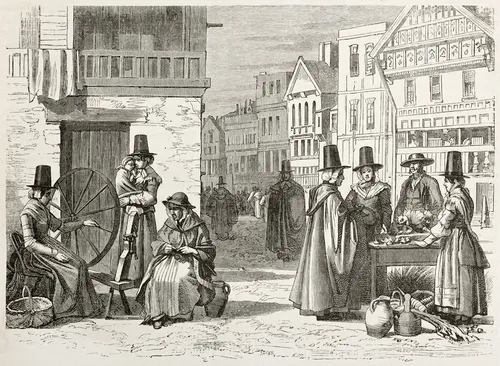As an Englishman of Irish descent married to a Welsh woman with a son called Owen and now living in Monmouthshire, I am keenly interested in the often uneasy relationship between Wales and England.
This rivalry arises from 1,000 years of Saxon/Norman/English efforts to conquer and assimilate Wales, (even to the extent of suppressing the Welsh language) – and the Welsh people’s vigorous attempts to defend themselves.
You can still encounter a certain amount of anti-English feeling in Wales today.
It can be relatively mild, as manifested in the Six Nations rugby where it’s seen as a good year if Wales lose all their matches but beat the sais (Saxon) as they call their rivals from across Offa’s Dyke. When England lose, I get sent a heap of abusive texts and emails from Welsh in-laws and friends. So you can imagine my inbox when Wales won the Grand Slam this year.
Or it can be voiced in slightly more rancorous tones as with the lady on the train last night. Speaking loudly (and with a Welsh-Scouse accent) she was telling someone who’d just sat down opposite her that Wales was “being ruined by reservoirs in the valleys and windmills on the hills. All to provide water and electricity for the English”. English incomers [that's me] were putting up house prices and English companies were taking all the jobs.
England – an easy target for all Welsh woes. Occasionally, this anti-English sentiment takes a very dark turn.
On the other hand, I’ve heard many English people disparage or dismiss the Welsh as “whingers” and “inward-looking” speaking a “dead” language. A history tutor at university called them “mini cultural imperialists” because all schoolchildren in Wales have to learn the language.
So many people have told me the story of walking into a Welsh pub and the locals, who were speaking English, suddenly speaking Welsh… I’ve been to dozens of Welsh pubs and never experienced this. I’ve been to many where I’ve been the only English speaker, however.
At the bottom of a lot of anti-Welsh sentiment is a misunderstanding of just how culturally different Wales was and still is. It's not just another region or a county with character such as Yorkshire.
Perhaps the best insight I’ve read into what it means to be Welsh comes from an English writer, George Borrow. In the mid 19
century, he set out to walk around Wales, roughly from north to south, and it soon becomes clear that he’s on a quest to find echoes of ancient Welsh bards – poets, singers and storytellers – and their modern (1850s) equivalents.
It’s a wonderful read. As a fluent Welsh speaker, Borrow disarms almost everyone he meets (but not everyone!) to build a remarkable picture of a country and its people so very different from the England he hails from.

(
.)
Of course, things have changed in the past 150 years but it’s a good primer for understanding that song, poetry and stories give Wales a powerful sense of identity – and unity.
Bards are still celebrated in televised Eisteddfods and ever-larger swathes of the country, particularly from Carmarthenshire north to Anglesey, chose to speak Welsh as a first language. Welsh art and culture are a source of massive pride – perhaps because they have survived in the face of historical oppression.
It’s why the Welsh say you have to pay to visit Wales across the Severn Bridges but it’s free to enter England. Taking this further, some Welsh folk stereotype the English as a staid people, lacking poetry. Which just doesn’t stand up. The English just don’t talk about it all the time.
When I hear fluent Welsh speakers converse, I find it very beautiful. And, crucially, it has words for expressing certain sights, sounds and emotions of which there is no equivalent in English.
However, there are some English words for which there are no equivalents in Welsh – hence the sudden punctuation of Welsh conversations with anglo-saxon expletives to get points across.
Where I live in Monmouthshire, England and Wales meet with the softest of collisions. It’s a borderland where people have learned to accept incomers and outcasts cheerfully. People often speak English with a Welsh accent and look to Bristol and Birmingham for work as much as Cardiff (a city that is the embodiment of a confident, modern Wales).
Welsh speaking is on the rise in places such as Abergavenny but you have to travel beyond Brecon, 20 miles west, to hear it spoken in the supermarket. Yet, even where I live, just 15 miles from England, the sense of being in another country is palpable.

